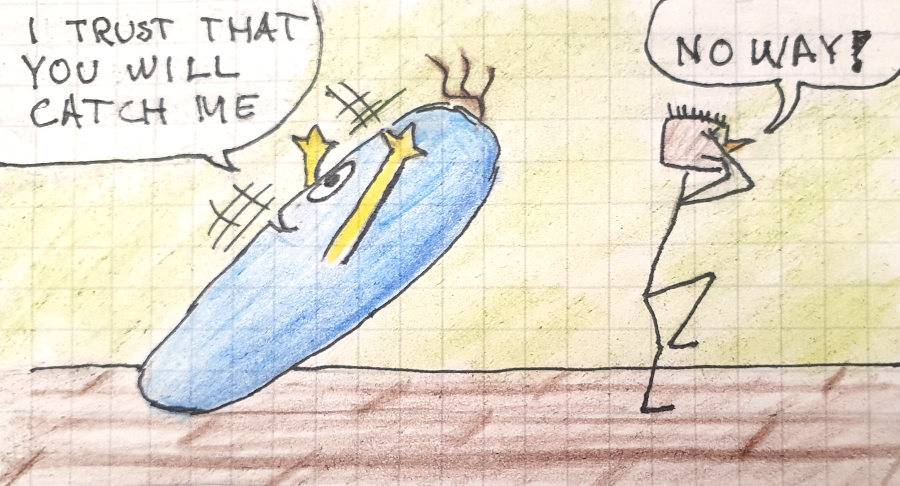
Who do you trust?
In our video Estimating a project, Mike Peat at Unicorn InterGlobal asked what a customer should look for in a third party software company and how they could measure trustworthiness.
I realize now when reading the question a second time, that I got all tangled up in the trust part of the question and not so much in the evaluating a supplier part. But maybe we can bring it all together in the end. This post is part of an attempt to do a bit of research before making a video on this topic and thus this post will also serve as a teaser for what is to come.
What is trust?
There has been some fascinating research done on the topic of trust and in some cases even scary experiments like the Milgram experiment where, though fictional, participants in the experiment we led to give deadly electric shocks to misbehaving victims. It is also important to note that we make the decision on how much we want to trust a person within a few milliseconds. Which is not rational, but something we are wired to do. And then we also an come in with preconceived ideas, that influence our level of trust, based on reputation and other external influences.
Much research as also been done to study cultures with different levels of trust, and not surprisingly, high trusting teams perform better, are more willing to collaborate and explore new ideas, and are more forgiving of mistakes.
I it like the trust you place in others become a self formfilling prophecy. If you tend to not trust others you try to control them and question their decisions, which in turn make them be more secretive in what information they share with you, trying to avoid getting caught. It you on the other hand praise them for trying, and instead suggest alternative solutions, they will gladly keep you in the loop, giving you more opportunities to course correct along the way.
This make sense, but not everybody might be convinced. Then this post about Kahneman and the Russian fighter pilots might shed some light over the effects of reward and punishment.
Measure trust
In my small research I have found a few ways of measuring trust. Some where you go in and measure on a specific list of generic behaviours, other where you look at your niche, the work you do and compare with expectations of your clients and based on that define a set of measurements that are specific to your business. As long as you measure something, you have a way of improving. If you along the way figure out that you are measuring the wrong thing, you can always change to something more appropriate.
There is also a well sited trust equation that take Credibility plus Reliability plus Intimacy and divide the sum with Self-Orientation. Though it is not entirely clear how to value those variables, the underlying idea seems good.
Credibility match up against your reputation, and the proof you can provide that you can solve the task at hand.
Reliability says something about how well and how quick you will be able to deliver.
Intimacy is based on how much you care about solving the problem.
Self-Orientation ties into Intimacy in why you care about solving the problem. Is it an internal drive, because you want to get something from the client, like a payment or an external concern that you share with the client and your primary goal is to help the client reach that goal.
Evaluating a supplier
Based on the findings above, you can draw many parallels to marketing strategies. When you look for a supplier, specifically a developer in this case. You want proof that they can deliver what you need. Do they have the education (Certificates), can they show proof of work (Portfolio), do they have good finances (Financial statement), have they been in business a long time and have they done work for any business you know. Perhaps you can get a referral as well, to get a better understanding of their reliability. As we move over to Reliability, we look at things like, do they show up and give you valuable information even if you do not specifically hire them to solve your problems. This is often referred to as content marketing as sending newsletters, producing relevant blogs or vlogs about topics that answer relevant questions to you.
When it comes to Intimacy, we move into the realm of perception. Are the developer listening to your needs, do they ask questions to gain more knowledge about your situation or do they just try to sell a product regardless if that product solves your problem or not. This is more of a feeling, but if you pay attention to this, there are early signs that can tell you where the collaboration is headed.
When looking at Self-Orientation we move closer to the Why that Simon Sinek is talking about in his TED talk "Start with why". It goes further then the Intimacy, because here you want to try to understand if the developer really cares about the same things you care about or if they are just after your money. This often shows itself as contributions with inspiring ideas from the developer, on how you together can make an even better solution then you have previously thought possible or if they refer you to other contacts or sources that can benefit your cause.
Conclusion
Even though trust seems to be a fuzzy topic, there are things you can do, both as a supplier and a client to evaluate trust and try to improve it. One thing is certain though, higher trust in all your relationships, be it at work, at home or with clients. Will be beneficial and make you a more happy person =)
- trust, trustworthiness, measure, business